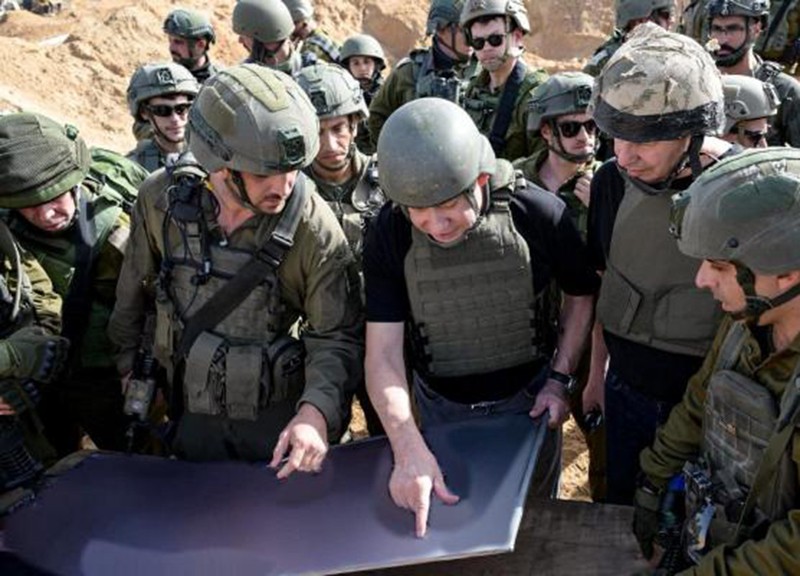
Three-step plan would likely face resistance from both sides
By Summer Said and Carrie Keller-Lynn - WSJ
Israel's war cabinet met Monday night to discuss a three-step plan put forward by Egypt for ending the war in Gaza, Israeli officials said.
The peace plan, a copy of which was reviewed by The Wall Street Journal, is the most comprehensive to be proposed to the two parties in the 11- week-old Gaza war. Some terms are expected to be strenuously resisted by both sides.
The deal calls for an initial pause in fighting to allow for the release of Israeli hostages including children, women and elderly in need of urgent medical attention, in exchange for the release of around 140 Palestinian prisoners. It would be followed by the formation of a transitional government for the Gaza Strip and the West Bank made up of Palestinian factions including Hamas.
Israel's war cabinet was meeting as pressure mounts to bring home the remaining 129 hostages, including 22 dead bodies, held by Hamas. It also comes as the death toll among Israeli soldiers is rising.
Israeli minister Benny Gantz, one of the war cabinet's three members, told a group of hostage families on Sunday that there are several proposals in the works to release those held but signaled it wasn't clear they were all being seriously considered, according to one of the at tendees at the meeting.
"I can't say there is progress yet," Gantz said, accord- ing to the person. "There are Egyptian proposals and there are other proposals flying around from all kinds of tions. I don't even know which of them are even relevant."
The White House National Security Council declined to comment on the Egyptian proposal. As efforts to reach a hostage deal continue, a Biden administration official said many competing ideas are culating, so it would be a mis take to put too much stock into any one.
On a visit to troops in north Gaza on Monday, Israeli Prime Minister Benjamin Netanyahu gave no signal that the war could end soon. "We're not stopping, the war continues until the end," he said. In a WSJ op-ed that published later Monday, Netanyahu outlined three prerequisites for peace between Israel and Palestinians in Gaza: "Hamas must be destroyed, Gaza must be demilitarized, and Palestinian society must be deradicalized." Egypt shared the multi-phased proposal late last week with Israel, Hamas, Qatar and the U.S. and has discussed parts of it with the Palestinian Authority, the semi-autonomous body that controls parts of the West Bank. Those discussions, according to Egyptian officials, included the creciration of a transitional, technocratic government after a cease-fire deal is reached between Israel and Hamas.
The proposal by Egypt will face significant hurdles on both sides. Including Hamas in any transitional government would run up against Israel's overarching war aim of eradi cating Hamas, while the release of senior Palestinian prisoners would meet resistance from Israel's right-wing government.
"This deal is really a victory for Hamas and it's really difficult for me to see the Israelis agreeing to that," said Gershon Baskin, who previously negotiated a hostage-release deal on Israel's behalf. Hamas's leader in Gaza, Yahya Sinwar, is unlikely to accept a deal by which he would relinquish power in Gaza and release Israeli hostages.
On Monday, the Israeli military said fighting continued in the Hamas stronghold of Khan Younis, where it is in the process of establishing operational control over the city's main routes. Israeli airstrikes over night killed dozens of Palestin ians in central Gaza, health authorities in Gaza said. Late Monday, the military said that soldiers found a Toyota Corolla vehicle that belonged to the family of the late Israeli hostage Samer Talalka. Talalka and two other Israeli hostages were mistakenly shot by Israeli soldiers earlier this month. Their deaths intensified pressure on Netanyahu's government to take new steps to free the remaining hostages.
The Egyptian proposal's first phase calls for Israel and Hamas to agree to a roughly 10-day pause in fighting, during which all civilian hostages being held in Gaza would be released in exchange for the Israeli release of around 140 Palestinian prisoners. That phase also calls on Israel to withdraw its forces from residential communities in Gaza and allow the free movement of Palestinians across the strip.
In the second and third phases, Israel and Hamas would negotiate the release of female Israeli soldiers, followed by male Israeli soldiers, in return for large numbers of Palestinian prisoners.














